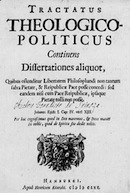
Source: Theologico-Political Treatise - Chapter IV - of the Divine Law
Spinoza's Chapter 4. – there is no greater gift than intellect and reason. It leads to the intellectual love of (Deus sive Natura) (Page 3)

As the love and knowledge of (Deus sive Nature) is man's highest happiness it follows that he who has it holds it does not do so from fear of punishment nor as one holds the love of things that give pleasure but because he is convinced of its supreme worth. It then is obvious that this love and knowledge should be the goal of all our actions.
To the common person this seems nonsense because what he holds to be the highest good are things that immediately satisfy his flesh. Those things are his chief delights. Whereas the intellectual love of (Deus sive Natura) consists solely in thought and pure reason. Spinoza says, "People who know that they possess no greater gift than intellect and sound reason, will doubtless accept what I have said without question.
Comment:
Intellect and reason are the hallmarks that distinguish human beings from all other animals. Can any statement other than the above better describe the rationalist point of view?